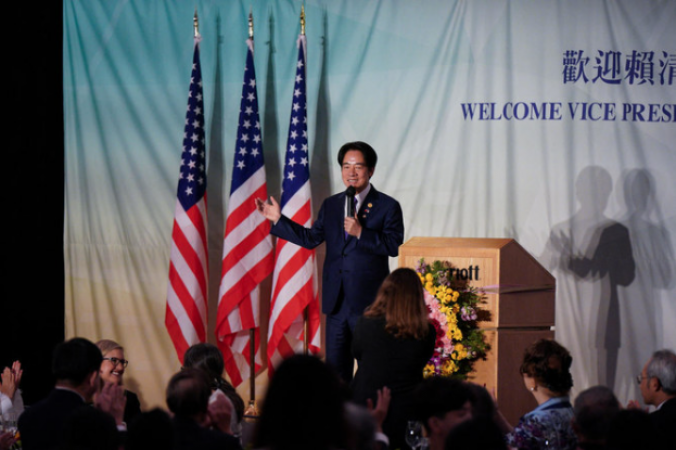
Taoyuan: Taiwan's Vice President William Lai has returned to Taiwan after a significant visit to the United States, a move that China has strongly criticized. This trip has not only triggered condemnations from China but also raised concerns among Taiwanese officials about potential increased Chinese military exercises near the island.
Reflecting on the visit, Lai expressed his appreciation for the collective efforts that have contributed to strengthening Taiwan's standing on the global stage. He remarked, "Because of everyone's hard work, Taiwan's power is stronger and stronger, and it showed the international community that Taiwan is a force for good, that the international community really pays great attention to Taiwan."
China asserts its claim over Taiwan, considering it a part of its territory, and has vehemently denounced Lai's stopovers in the United States. Chinese authorities have labeled Lai a separatist and provocateur.
Also Read: Sentenced: Woman Who Sent Ricin to Trump and Officials Receives 22-Year Prison Term
Taiwanese authorities anticipate that China might stage military maneuvers in the vicinity of the island in response to Lai's U.S. visit, using it as a pretext to intimidate voters ahead of the forthcoming presidential election. Their goal is to create an atmosphere of apprehension concerning the prospect of conflict.
Despite these concerns, Taiwan has not yet reported any unusual military activities by China in close proximity to the island.
Recent weeks have seen an escalation of military posturing and joint drills by both China and the United States across the Asian region. Japan reported that a combined fleet of 11 Chinese and Russian naval ships, including destroyers, traversed waters between the southern Japanese islands of Okinawa and Miyako, a key passage to the Pacific and East China Seas. This area lies directly east of Taiwan, and Okinawa houses a major U.S. military base.
Unnamed sources familiar with security planning suggested that this China-Russian fleet conducted simulated attacks on U.S. forces stationed in Okinawa and practiced capturing strategic locations. The U.S. Navy's 7th Fleet was also reportedly present in the waters about 800 nautical miles off Taiwan's eastern coast.
Amid these developments, Taiwan's defense ministry released a compelling video showcasing fighter jets taking off and missiles being prepared. The video is titled "The military of the Republic of China is duty-bound to maintain regional peace and stability," reinforcing Taiwan's determination to safeguard its sovereignty.
Also Read: Opposition Leader's Hunger Strike: Intensive Care Alarm Bells in Senegal
Lai's U.S. stopovers were transitory, occurring in New York and San Francisco as he traveled to and from Paraguay to attend the inauguration of the country's new president. Paraguay is one of the limited number of nations with formal diplomatic ties to Taipei.
Despite his past remarks about practical work for Taiwan independence, Lai, who is a frontrunner in Taiwan's upcoming presidential elections, has committed to maintaining the status quo and engaging in discussions with Beijing. This visit and its implications underline the intricate challenges and dynamics Taiwan faces on both the regional and international fronts.